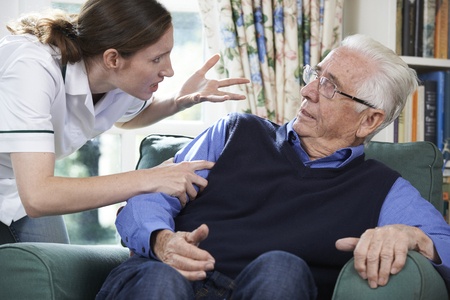How to Screen Elder Caregivers
April 27, 2016 | Category: Nursing Home Neglect/Abuse | ShareThe National Center on Elder Abuse (NCEA) reports that the fastest growing segment of America’s population consists of those 85 and older. By 2050, 20 percent of the U.S. population will be age 65 and older. NCEA is not certain  how many people are suffering from elder abuse and neglect as many abuses go unreported, and the signs of elder abuse may be missed by the professionals working with the elderly.
how many people are suffering from elder abuse and neglect as many abuses go unreported, and the signs of elder abuse may be missed by the professionals working with the elderly.
In training future medical practitioners and physicians, the Stanford Medical School reports that the healthcare community can provide a “vital, important opportunity” to screen for elder/dependent adult abuse. In “How to Screen” they recommend the following questions be asked, in an interview style, when elders are in a medical facility for treatment or consultation:
- Do you feel safe where you live?
- Who prepares your food?
- Does someone help you with your medication?
- Who takes care of your checkbook?
- Does anyone at home hurt you?
- Do they scold or threaten you?
- Do they touch you without your consent?
- Do they make you do things you do not want to do?
- Did they take anything that is yours without asking?
- Did they have you sign any documents you did not understand?
- Are you afraid of anyone at home?
- Are you alone a lot?
- Has anyone ever failed to help you take care of yourself when you needed help?
(Adapted by Stanford Medical School from Ansell, P. & Breckman, R. (1988). Elder mistreatment guidelines for health care professionals: Detection, assessment, and intervention. New York: Mount Sinai/Victim Services Agency.)
“The screening of caregivers, including nursing homes and assisted living facilities, is important not only for the elderly but also for anyone needing special care. Nursing home abuse in Florida is a serious problem. The questions above are questions that can be asked by any family member or friend of an elderly person. Also, watching for the possible outward signs of abuse is important. Following are some of the signs to look for from HelpGuide.org,” says Port Charlotte Nursing Home Abuse Attorney, Randall Spivey of Spivey Law Firm, Personal Injury Attorneys, P.A.
General Signs of Abuse
- Frequent arguments or tension between the caregiver and the elderly person
- Changes in personality or behavior in the elder
If abuse is suspected, but you are not sure, you can look for clusters of the following physical and behavioral signs:
Physical abuse (including sexual abuse):
- Unexplained signs of injury, such as bruises, welts, or scars, especially if they appear symmetrically on two sides of the body
- Broken bones, sprains, or dislocations
- Report of drug overdose or apparent failure to take medication regularly (a prescription has more remaining than it should)
- Broken eyeglasses or frames
- Signs of being restrained, such as rope marks on wrists
- Caregiver’s refusal to allow you to see the elder alone
Emotional abuse:
- Threatening, belittling, or controlling caregiver behavior that you witness
- Behavior from the elder that mimics dementia, such as rocking, sucking, or mumbling to oneself
Neglect:
- Unusual weight loss, malnutrition, dehydration
- Untreated physical problems, such as bed sores
- Unsanitary living conditions: dirt, bugs, soiled bedding and clothes
- Being left dirty or unbathed
- Unsuitable clothing or covering for the weather
- Unsafe living conditions (no heat or running water; faulty electrical wiring, other fire hazards)
- Desertion of the elder at a public place
Financial exploitation:
- Significant withdrawals from the elder’s accounts
- Sudden changes in the elder’s financial condition
- Items or cash missing from the senior’s household
- Suspicious changes in wills, power of attorney, titles, and policies
- Addition of names to the senior’s signature card
- Unpaid bills or lack of medical care, although the elder has enough money to pay for them
- Financial activity the senior could not have done, such as an ATM withdrawal when the account holder is bedridden
- Unnecessary services, goods, or subscriptions
Health care fraud and abuse:
- Duplicate billings for the same medical service or device
- Evidence of overmedication or under medication
- Evidence of inadequate care when bills are paid in full
- Problems with the care facility: poorly trained, poorly paid, or insufficient staff; crowding; inadequate responses to questions about care
“If you feel your loved one has been abused in any place, in any way, contact our law firm immediately. Our experienced team of elder abuse attorneys will be able to assist you and your loved one with no costs or attorney’s fees until you win,” said Attorney Spivey.
Port Charlotte Nursing Home Abuse Attorney, Randall L. Spivey is a Board Certified Trial Attorney – the highest recognition for competence bestowed by the Florida Bar and a distinction earned by just one (1%) percent of Florida attorneys. He has handled over 2,000 personal injury and wrongful death cases throughout Florida. For a free and confidential consultation to discuss your legal rights, contact the Spivey Law Firm, Personal Injury Attorneys, P.A., in Lee County at 239.337.7483 or toll free at 1.888.477.4839,or by email to Randall@SpiveyLaw.com. Visit SpiveyLaw.com for more information. You can contact Spivey Law Firm, Personal Injury Attorneys, P.A.in Charlotte County at 941.764.7748 and in Collier County 239.793.7748.

